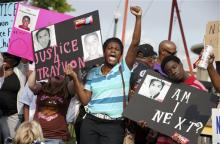
Protestors gather in Sanford, Fla., on Thursday, March 22, 2012, to demand justice in the shooting death of Trayvon Martin, the black teenager who was fatally shot by a neighborhood watch captain a month earlier. (AP Photo/Julie Fletcher)
(CNSNews.com) – The Rev. Jesse Jackson, founder and president of the Rainbow Push Coalition, wants the United Nations’ human rights watchdog brought into the debate over the shooting of Trayvon Martin.
Various parts of the U.N. human rights system have in the past weighed in on the Feb. 2012 shooting of the 17-year-old, criticizing Florida’s “stand your ground” law and, in one case, calling for “reparation for the victims.”
But Jackson is proposing an investigation by the U.N.’s top human rights apparatus, the Human Rights Council (HRC), a controversial body whose ranks include regimes with poor human rights records, including some of America’s most vocal critics.
A jury late Saturday found former neighborhood watch volunteer George Zimmerman not guilty of second-degree murder and manslaughter relating to Martin’s death.
Among the many and ongoing reactions to the acquittal, Jackson called in a statement for “a national investigation of the racial context that led to Trayvon Martin’s slaying.”
“Congress must act,” he added. “And it’s time to call on the United Nations Human Rights Commission for an in-depth investigation of whether the U.S. is upholding its obligations under international human rights laws and treaties.” (The Human Rights Commission no longer exists; it was replaced by the HRC in 2006.)
Every U.N. member state undergoes a HRC “universal periodic review” every four years, and the next one examining the U.S. record is not scheduled until May 2015.
But governments and non-governmental organizations have many other opportunities during regular HRC sessions in Geneva to raise issues pertaining to specific countries – as the NAACP did last year in drawing the council’s attention to what it called “voter-suppression” measures like voter-ID laws.
Several other cogs in the U.N. human rights system already have taken note of aspects of the Martin shooting.
Days before Zimmerman was indicted in April 2012 – at a time when local, state and federal inquiries had been underway for weeks – U.N. High Commissioner for Human Rights Navi Pillay called for “an immediate investigation” into the shooting.
“The law should operate equally in respect of all violations,” she said during a visit to Barbados. “So, like every other situation such as this, we will be urging an investigation, and prosecution and trial – and of course reparation for the victims concerned.”
One of the various bodies falling under Pillay’s office is the “Working Group of Experts on People of African Descent.”
At a session of the working group in Geneva in May 2012 one of its members, French law professor Mireille Fanon Mendes-France, discussed some of the challenges faced by people of African descent.
“She focused on the issue of the administration of justice and the discrimination that people of African descent faced in terms of access to justice,” the U.N. said in a report on the meeting.
“She highlighted the case of Trayvon Martin in the United States of America and stressed that the process of justice was often different for people of African descent and other populations.”
Last December the Travyon Martin case was raised during a meeting of yet another U.N. body in Geneva – the Human Rights Committee, which oversees countries’ compliance with the International Covenant on Civil and Political Rights (ICCPR).
In a report focusing on gun violence, the committee cited the Martin shooting and criticized Florida’s “stand your ground” laws, saying they were not compliant with “international human rights principles of necessity and proportionality, [under which] there is a general duty to avoid the use of force where non-violent means of self-protection are reasonably available.”
The committee, a body of 18 experts, is preparing to review U.S. compliance with the ICCPR during a session in the fall.
Source material can be found at this site.









